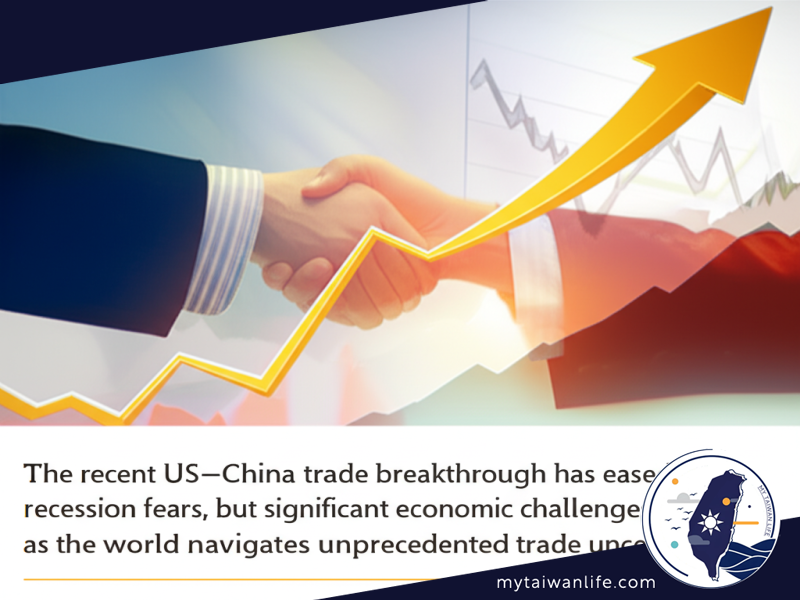Trump's China Trade Deal: Averted Recession or Temporary Reprieve?
The recent US-China trade breakthrough has eased recession fears, but significant economic challenges remain as the world navigates unprecedented trade uncertainty.

President Donald Trump's actions on trade with China brought the US economy to the brink of a potential recession, but a recent deal has offered a reprieve. The agreement involves a 90-day halt in the trade war, slashing tariffs between the world's two largest economies. While this move has ignited optimism on Wall Street, economists urge caution, warning that the threat of recession persists, even if the likelihood has diminished.
Tariffs, though reduced, remain significantly higher than in previous decades, and economic uncertainty is elevated. The consequences for confidence and trade flows won't disappear immediately. Experts point out the absence of a "playbook" for navigating the economic shocks experienced in such a short time. Douglas Holtz-Eakin, president of the American Action Forum, stated, "We are far from out of the woods," emphasizing that tariffs remain at levels unseen in a century, representing a substantial tax increase.
The drastic tariff hikes of 145% on Chinese goods threatened to cripple trade. Experts predicted supply chain issues and empty store shelves. According to Erica York, vice president of federal tax policy at the Tax Foundation, the administration's backtrack "shows the administration realizes what a disaster it would have been." A senior administration official noted President Trump's sensitivity to the reaction of financial markets and the image of economic disruption. Peter Boockvar, chief investment officer at Bleakley Financial Group, commented on the situation, saying, “Both sides luckily decided to save Christmas."
Despite the tariff reductions to 30% for at least 90 days, import taxes remain significantly higher than at the start of the year. Moody’s Analytics calculates the US effective tariff rate has fallen from 21.3% to 13.7%, still the highest level since 1910. Mark Zandi, chief economist at Moody’s Analytics, estimates this will add more than one percentage point to US inflation over the next year and decrease gross domestic product (GDP) by the same amount.
Zandi has reduced his recession forecast, but not dramatically. He now estimates a 45% chance of a US recession this year, down from 60%. He warns the economy remains vulnerable. Justin Wolfers, an economics professor at the University of Michigan, noted that the situation is better today than yesterday, but still worse than at the beginning of Trump’s presidency. Wolfers estimates that the risk of a recession is roughly 50/50. Kathy Bostjancic, chief economist at Nationwide, forecasts a slight economic growth this year, while inflation is still expected to increase to 3.4%.
President Trump himself acknowledged that tariffs could increase if a deal isn't reached within the 90-day period. Sector-specific tariffs on goods, including lumber, semiconductors, pharmaceuticals, and critical minerals, still loom. Joe Brusuelas, chief economist at RSM, continues to forecast a 55% chance of a recession over the next 12 months, emphasizing the uncertainties tied to sector-specific tariffs. Deutsche Bank economists expressed relief about the easing trade war, highlighting the improved global growth outlook and the reduced uncertainty.
Trade policy uncertainty has risen to unprecedented levels, adding to the financial pressure faced by businesses. Wolfers describes the levels of uncertainty as “paralyzingly high.” Holtz-Eakin views the situation as "a manufactured crisis," and Wolfers questions whether the calm will persist over the coming 90 days, underscoring the potential for further volatility in US trade policy.
Other Versions
El acuerdo comercial de Trump con China: ¿recesión evitada o indulto temporal?
L'accord commercial de Trump avec la Chine : récession évitée ou sursis temporaire ?
Kesepakatan Perdagangan China Trump: Menghindari Resesi atau Penangguhan Sementara?
L'accordo commerciale con la Cina di Trump: recessione evitata o tregua temporanea?
トランプ大統領の中国貿易協定:景気後退の回避か、一時的な猶予か?
트럼프의 중국 무역 협상: 경기 침체 방지인가, 일시적 유예인가?
Kasunduan sa Kalakalan ng Trump sa Tsina: Nalayuang Resesyon o Pansamantalang Pag-urong?
Торговая сделка с Китаем: предотвращение рецессии или временная отсрочка?
ข้อตกลงการค้าจีนของทรัมป์: หลีกเลี่ยงภาวะเศรษฐกิจถดถอย หรือเพียงบรรเทาชั่วคราว?
Thỏa thuận thương mại Trung Quốc của Trump: Tránh suy thoái hay Tạm hoãn?

